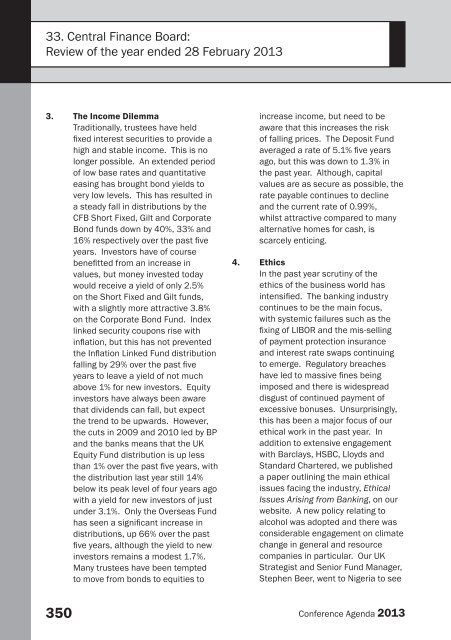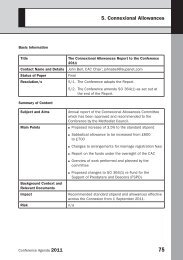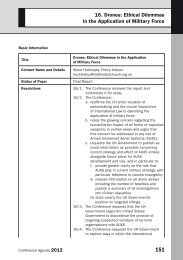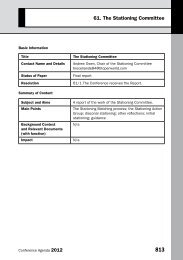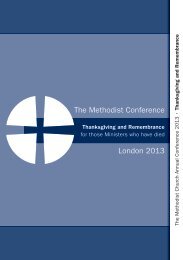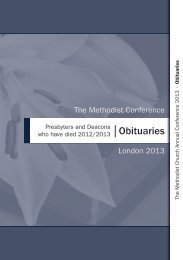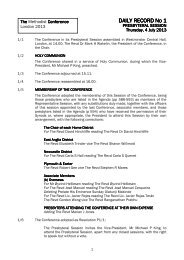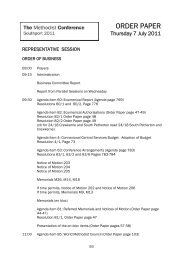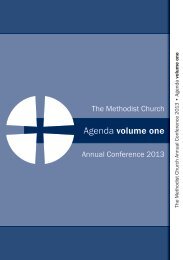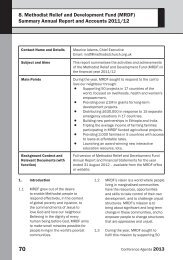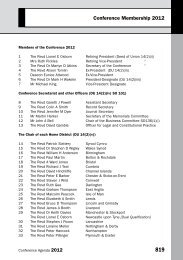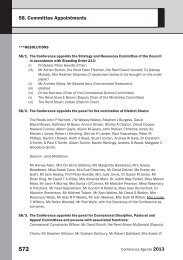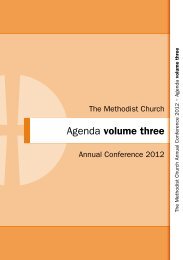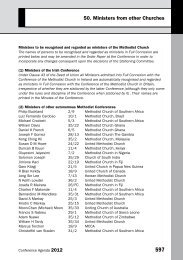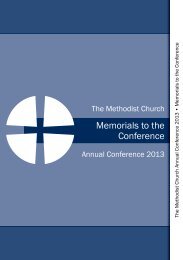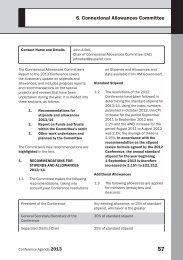Agenda Volume 2 - Methodist Conference
Agenda Volume 2 - Methodist Conference
Agenda Volume 2 - Methodist Conference
Create successful ePaper yourself
Turn your PDF publications into a flip-book with our unique Google optimized e-Paper software.
33. Central Finance Board:<br />
Review of the year ended 28 February 2013<br />
3. The Income Dilemma<br />
Traditionally, trustees have held<br />
fixed interest securities to provide a<br />
high and stable income. This is no<br />
longer possible. An extended period<br />
of low base rates and quantitative<br />
easing has brought bond yields to<br />
very low levels. This has resulted in<br />
a steady fall in distributions by the<br />
CFB Short Fixed, Gilt and Corporate<br />
Bond funds down by 40%, 33% and<br />
16% respectively over the past five<br />
years. Investors have of course<br />
benefitted from an increase in<br />
values, but money invested today<br />
would receive a yield of only 2.5%<br />
on the Short Fixed and Gilt funds,<br />
with a slightly more attractive 3.8%<br />
on the Corporate Bond Fund. Index<br />
linked security coupons rise with<br />
inflation, but this has not prevented<br />
the Inflation Linked Fund distribution<br />
falling by 29% over the past five<br />
years to leave a yield of not much<br />
above 1% for new investors. Equity<br />
investors have always been aware<br />
that dividends can fall, but expect<br />
the trend to be upwards. However,<br />
the cuts in 2009 and 2010 led by BP<br />
and the banks means that the UK<br />
Equity Fund distribution is up less<br />
than 1% over the past five years, with<br />
the distribution last year still 14%<br />
below its peak level of four years ago<br />
with a yield for new investors of just<br />
under 3.1%. Only the Overseas Fund<br />
has seen a significant increase in<br />
distributions, up 66% over the past<br />
five years, although the yield to new<br />
investors remains a modest 1.7%.<br />
Many trustees have been tempted<br />
to move from bonds to equities to<br />
increase income, but need to be<br />
aware that this increases the risk<br />
of falling prices. The Deposit Fund<br />
averaged a rate of 5.1% five years<br />
ago, but this was down to 1.3% in<br />
the past year. Although, capital<br />
values are as secure as possible, the<br />
rate payable continues to decline<br />
and the current rate of 0.99%,<br />
whilst attractive compared to many<br />
alternative homes for cash, is<br />
scarcely enticing.<br />
4. Ethics<br />
In the past year scrutiny of the<br />
ethics of the business world has<br />
intensified. The banking industry<br />
continues to be the main focus,<br />
with systemic failures such as the<br />
fixing of LIBOR and the mis-selling<br />
of payment protection insurance<br />
and interest rate swaps continuing<br />
to emerge. Regulatory breaches<br />
have led to massive fines being<br />
imposed and there is widespread<br />
disgust of continued payment of<br />
excessive bonuses. Unsurprisingly,<br />
this has been a major focus of our<br />
ethical work in the past year. In<br />
addition to extensive engagement<br />
with Barclays, HSBC, Lloyds and<br />
Standard Chartered, we published<br />
a paper outlining the main ethical<br />
issues facing the industry, Ethical<br />
Issues Arising from Banking, on our<br />
website. A new policy relating to<br />
alcohol was adopted and there was<br />
considerable engagement on climate<br />
change in general and resource<br />
companies in particular. Our UK<br />
Strategist and Senior Fund Manager,<br />
Stephen Beer, went to Nigeria to see<br />
350<br />
<strong>Conference</strong> <strong>Agenda</strong> 2013


